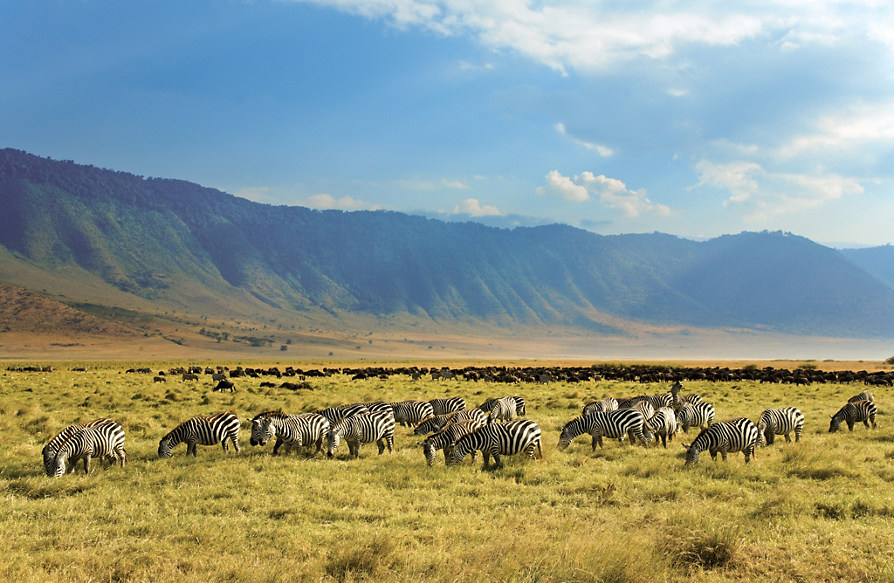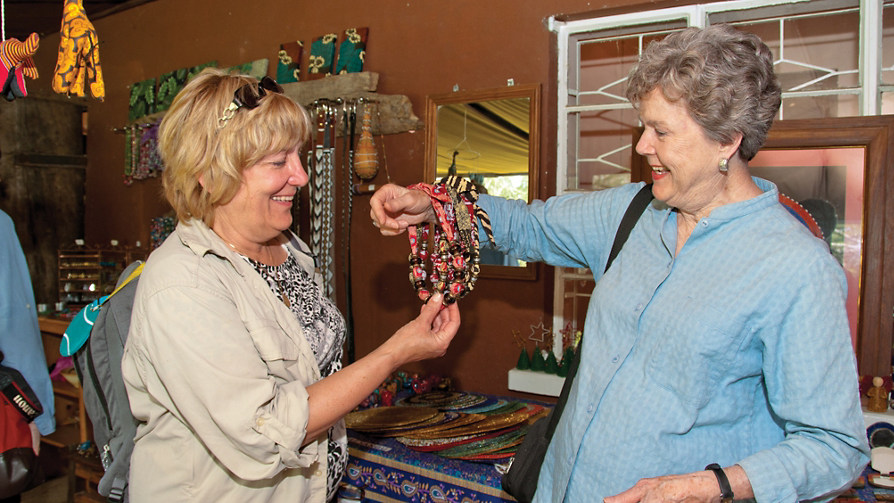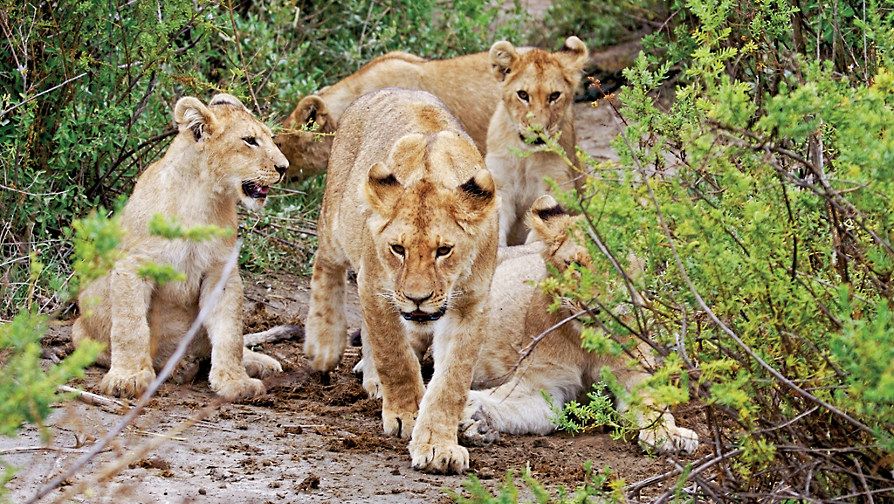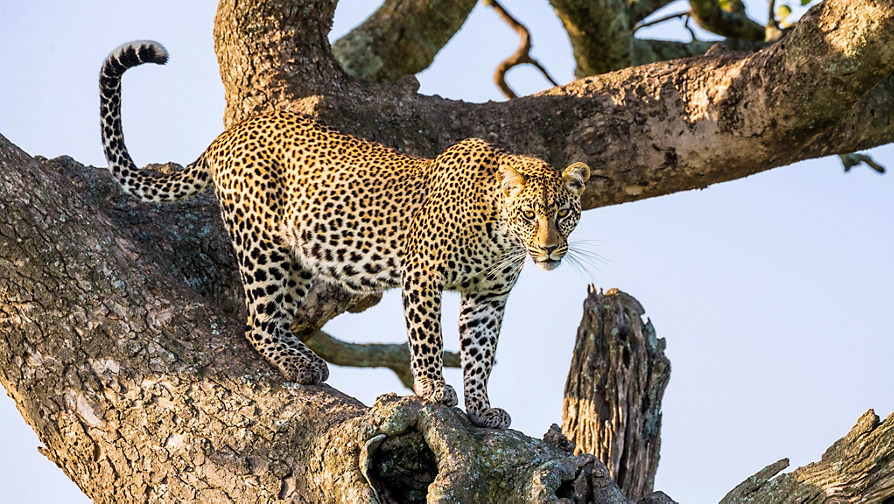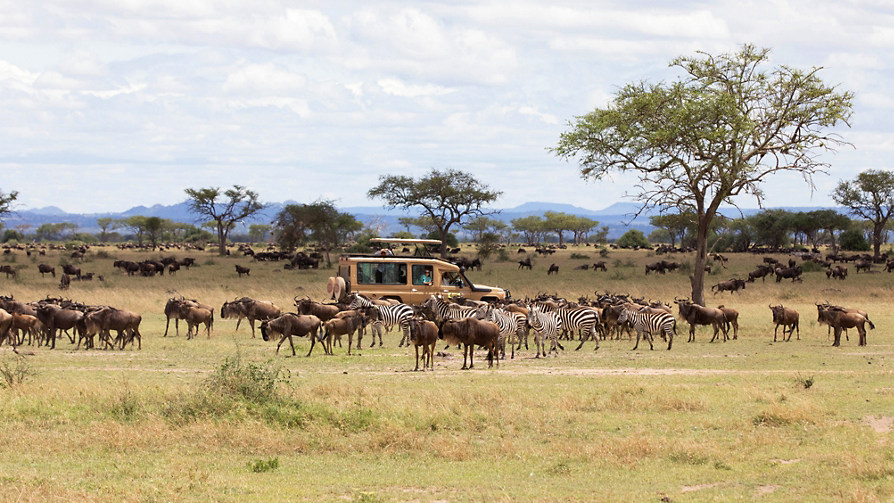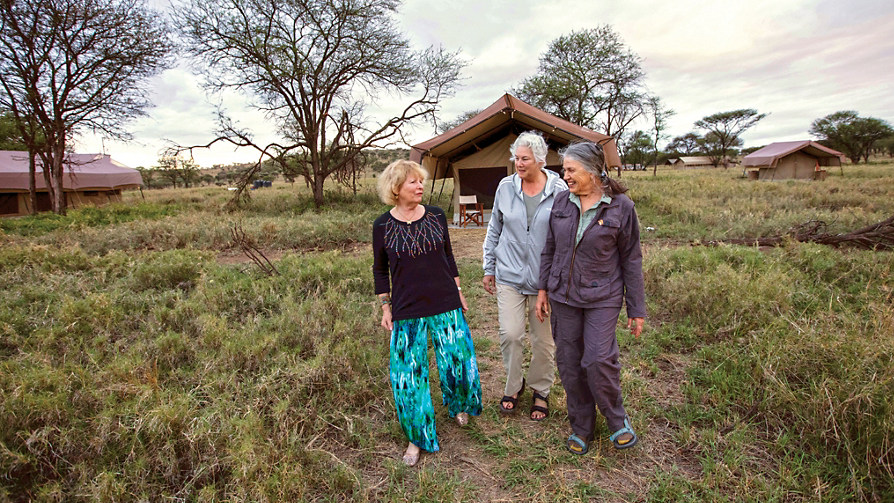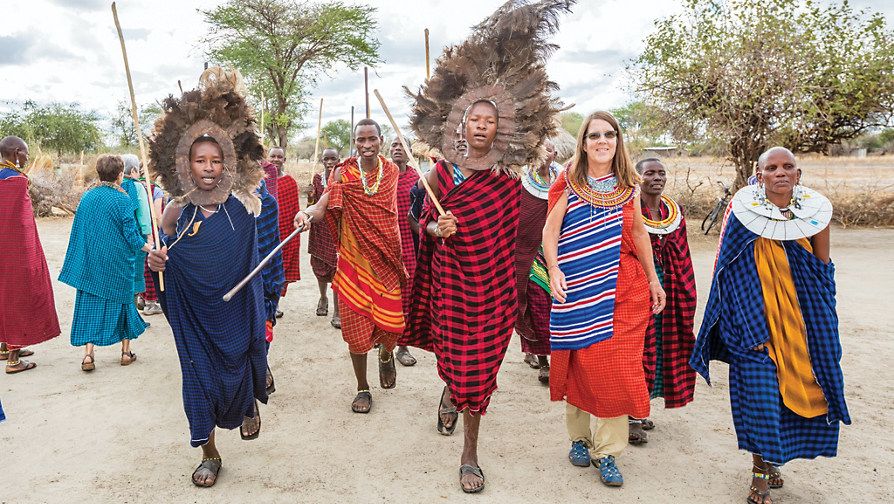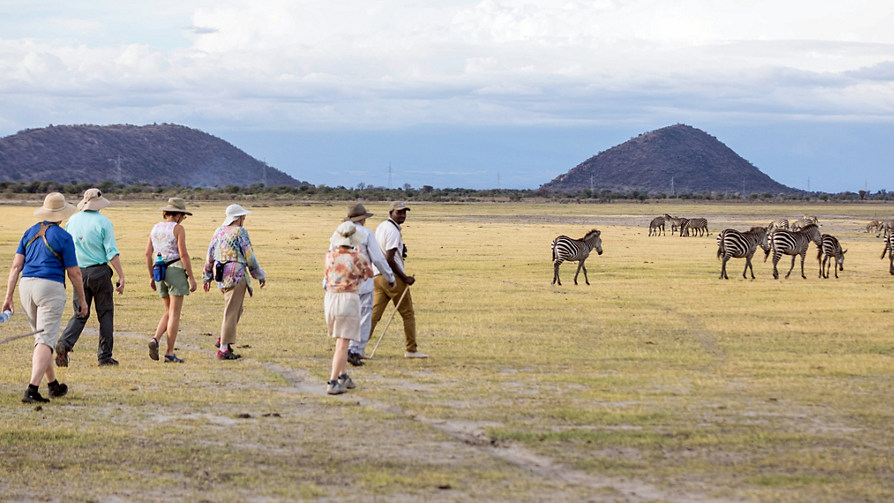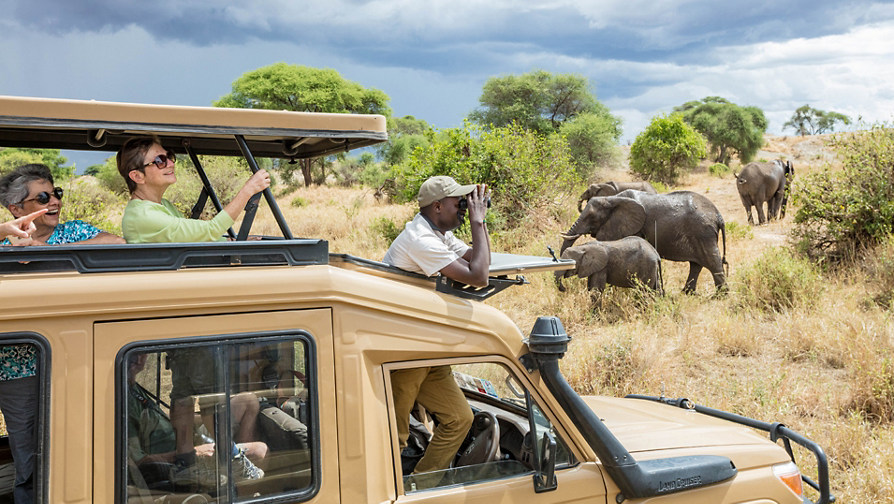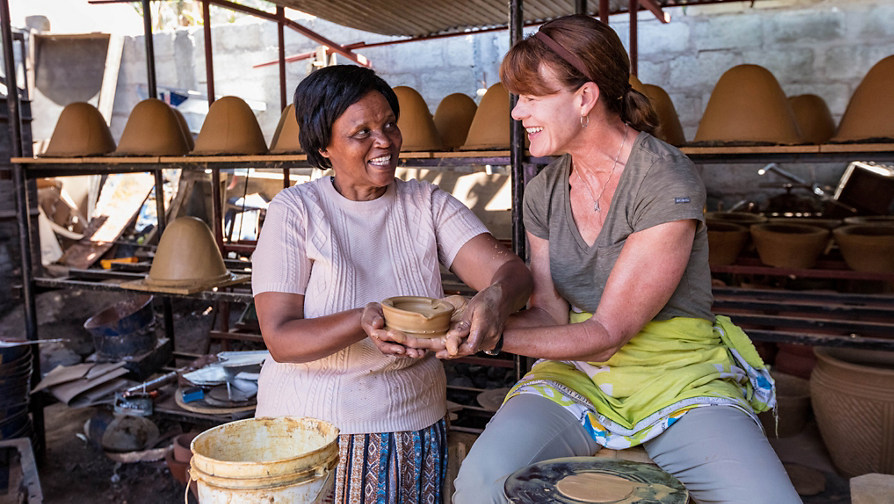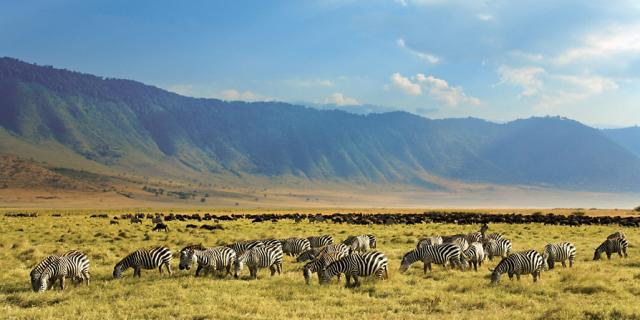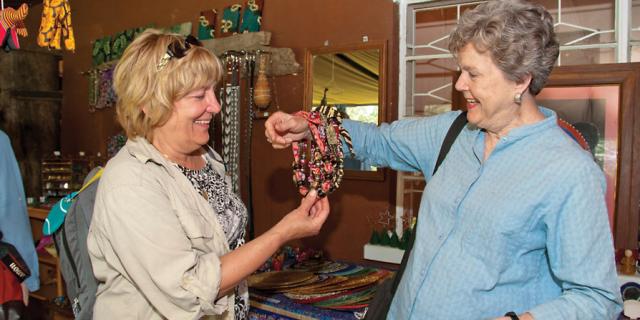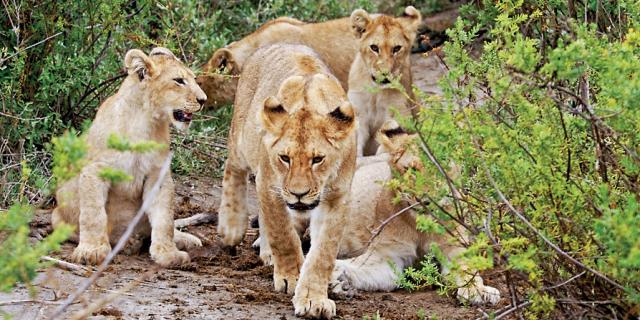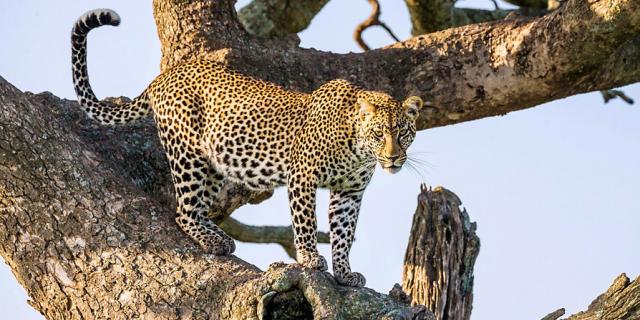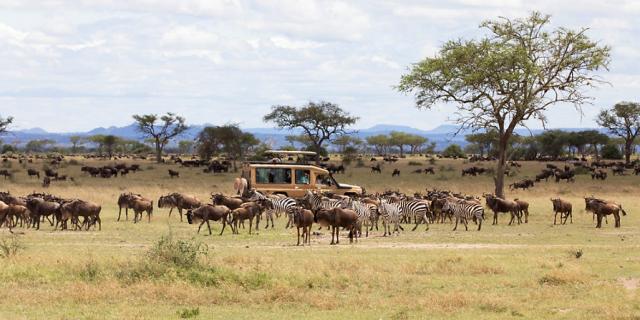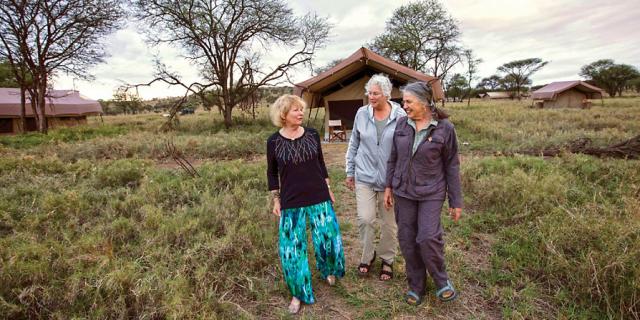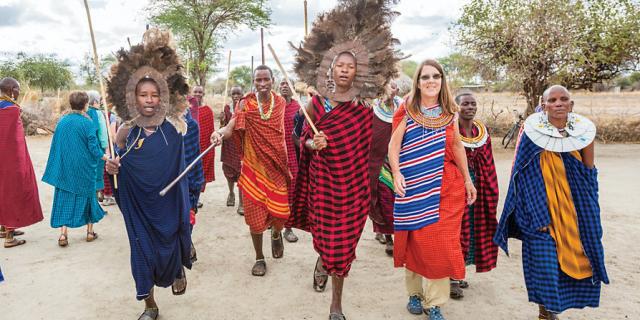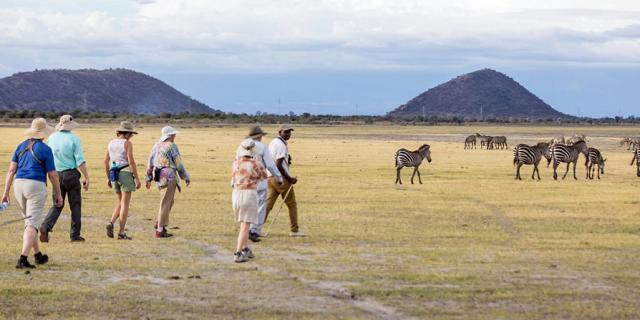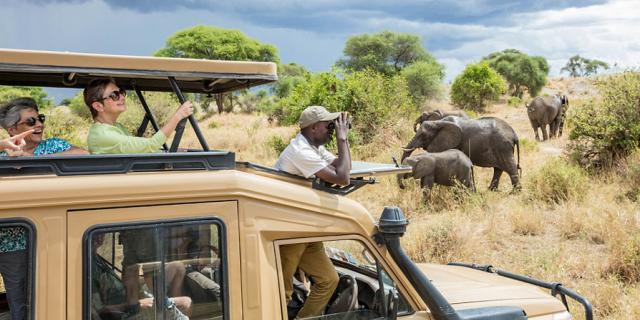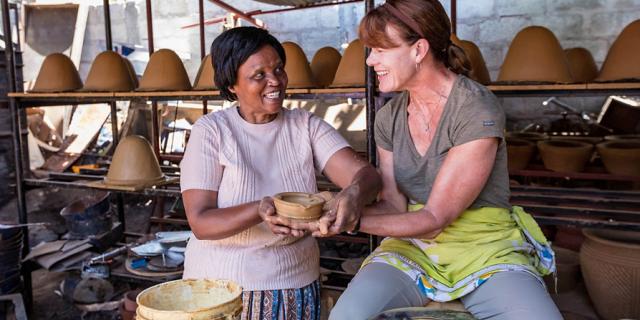- Explore in a small group of 8-16 travelers (average group size of 13)
- All land transportation
- Accommodations for 11 nights (and 1 day room)
- 33 meals—11 breakfasts, 11 lunches, and 11 dinners
- 15 small group activities, including up to 8 game-viewing drives
- Services of a local O.A.T. Trip Experience Leader and driver-guides
- Gratuities for local guides, drivers, lodge and camp staff, driver-guides, and luggage porters
- 5% Frequent Traveler Credit toward your next adventure
- Complimentary O.A.T. safari duffel bag
Please note:
Deposit requirement on land trips
Past traveler savings of 5% if you traveled from 2018 onward
New travelers get $100 savings
The legendary plains of the Serengeti teem with one of the densest concentrations of wildlife on Earth, lending them an aura of Africa at its most primitive. Thomson’s gazelle, Cape buffalo, and elephant vie for survival here amidst grand backdrops, such as magnificent Tarangire National Park, and Ngorongoro Crater, a twelve-mile-wide, 2,000-foot-deep caldera.
Travel to Tanzania and explore it all on an adventure 95% of travelers rated excellent, as our O.A.T. Trip Experience Leader and expert driver-guides help you seek out the most elusive game. In a tight-knit small group, immerse yourself in African culture through rewarding visits to schools and villages, where we'll get one-on-one time with local residents, including the remarkable Maasai people during our A Day in the Life experience. Truly get to know the traditional lifestyle of this semi-nomadic tribe, as you visit them in their bomas (villages), step into their mud huts, and learn about their daily chores, crafts, and values. Plus, throughout your adventure, you'll discuss Controversial Topics with local experts, including the persecution of Tanzanian albinos, female genital mutilation, the marginalization of disabled people, and the struggle of buffer zone communities around Serengeti National Park.
At night, retire to unique and varied lodgings, including a four-night stay at our exclusive O.A.T. private tented camp in the Serengeti, where regionally-inspired cuisine and first-rate service close out each day of discovery.
And whenever you’d like, you have the freedom to explore more of Tanzania on your own: Break off from the group for independent discoveries in Arusha—like visiting a women’s cooperative or a crafts workshop—during free time.
DAY 1
Depart U.S.
You depart today on your overnight flight from the U.S. to Arusha, Tanzania. You will most likely have one connection in Amsterdam, with about a 2-hour layover.
DAY 2
Arrive in Arusha, Tanzania • Transfer to lodge
Destination: Arusha
Accommodations: Moivaro Lodge
Activity Note: The drive from Kilimanjaro International Airport to our lodge in Arusha is approximately one hour, and will include a mix of bumpy, dusty, and more modern, paved roads.
Dinner/Evening: You arrive around 8:30pm at Kilimanjaro International Airport. Upon arrival, expect to spend about 45 minutes clearing customs and have your temperature checked. An O.A.T. representative will then meet you in arrivals and escort you to your hotel in Arusha by minivan, minibus, or motorcoach, depending on the number of travelers who arrived with you. The transfer is approximately 1 hour. At the lodge, we'll be joined by fellow travelers who took our optional pre-trip extension to either Foothills of Mount Kilimanjaro: Maasai Visits & Game Drives or Kenya's Masai Mara National Reserve. Before receiving room assignments and checking in, our small group will again have our temperatures checked.
We spend two nights in our lodge, which is likely located just outside the town of Arusha. Depending on where we stay, typical accommodations feature individual thatched cottages, each with a private bath, private veranda, and fireplace. Typical lodges also feature an international restaurant, bar and lounge, swimming pool, and wireless Internet in the main bar and lounge area.
You will have the option to eat dinner at the lodge, or retire to your room for the night to rest before the next day’s activities. For dinner, you can choose from a selection of local and Western dishes in the lodge's on-site restaurant.
DAY 3
Arusha • Visit Safe Water Ceramics • Controversial Topic: The persecution of Tanzanian albinos with Sister Martha Mganga & Jumanne Idd
Destination: Arusha
Meals included: B L D
Accommodations: Moivaro Lodge or similar
Exclusive O.A.T. Activity: Today’s activities feature the Controversial Topic of albinism in Tanzania and the persecution of those living with the condition. Led by nonprofit director Sister Martha Mganga and witch doctor Jumanne Idd, our conversation will provide an intimate look into the lives, hardships, and negative connotations of albino people. It will also examine the physical, psychological, and emotional threats they continue to face. Read more about this activity below.
Breakfast: Served buffet-style at our lodge beginning at 6am, and featuring local and American options.
Morning: We’ll meet with our Trip Experience Leader for a Welcome Briefing at our lodge around 10am. During this briefing, we will introduce ourselves and review our itinerary in more detail (including any changes that may need to occur). We will also discuss safety and emergency procedures, and answer any questions we may have, including where we'll be able to find an ATM or local market. After our briefing, our Trip Experience Leader will take us on a short walk around our lodge to get acclimated with the area.
At around 11:15am, we’ll travel about a half hour by motorcoach to Safe Water Ceramics of East Africa, where a worker at the facility will teach our group about this organization's efforts to increase access to clean water for the people of Africa. After learning many Tanzanians didn’t have access to clean water in 2005, an American woman and volunteer pottery instructor co-founded the organization, which now produces affordable ceramic water filters which provide five years of clean water for each family. Here, in the company of our local Trip Experience Leader, and no doubt in large part to our small group size, we'll get a hands-on demonstration led by a worker at the organization of how the handmade filters work, as well as a tour of the award-winning facility. We will also have the option to purchase a filter (or several as a group) to provide to locals in need later in our adventure.
Around 12:30pm, we'll depart by motorcoach for an approximately 10-minute drive to a local restaurant.
Lunch: At a local restaurant in Arusha around 12:45pm, where we will learn how to make traditional dishes such as polenta, plantains, and makande (a succotash made with kidney beans and maize) during a cooking demonstration led by the restaurant staff, including Chef Winifrida. After our instruction, we’ll enjoy the fruits of our labor for lunch.
Afternoon: When lunch wraps up around 2pm, we'll take an approximately 10-minute drive to visit the Albino Peacemaker Center, a local organization that helps albino people living in the area. Here, we’ll discuss the Controversial Topic of albinism in Tanzania and the continued persecution of those with the condition. This is an appropriate backdrop for our conversation, as the center is a beacon of hope for this targeted population. They rely on the organization for many things—from counseling services to career opportunities and even sunblock. The peacemaker center also works closely with government officials to affect social change and combat negative and false connotations associated with albinism.
To facilitate this discussion, we’ll meet with organization director Sister Martha Mganga, who will begin by outlining concerns for albino Tanzanians as well as the steps being taken to change public perception of the disorder. We’ll also learn how the center strives to educate albinos about their condition, particularly in so far as how it is impacted by sun exposure. To shed light on the other side of the issue, we’’ll meet with another speaker: 51-year-old Jumanne Idd, a witch doctor who hails from Arusha. Jumanne comes from a long line of witch doctors in his family, and he himself has been practicing the craft for nearly 40 years. In speaking with him, we’ll come to understand the many superstitions surrounding albinism. He’ll also talk about his wide-ranging clientele, which includes politicians, government officials, and prominent businessmen.
Albinism is one of the most misunderstood conditions in the world, and as such, those who suffer from it have been tormented for centuries. The condition—which affects an estimated .005% of the world—is characterized by a reduction of melatonin production, or in some cases, no production at all, resulting in lack of skin pigmentation. While the science is clear, the genetic disorder has historically been framed as a contagion or "punishment" for past sins rather than a naturally occurring medical condition, particularly in Tanzania where the albino population is the highest in Africa. Furthermore, according to Pew Research Center, a quarter of Tanzanians fervently believe in witchcraft, a modern Pagan religion that associates albinism with magical powers. This baseless conviction is used to justify the systematic killings and dismemberment of albino people, whose body parts are then used in rituals and potions as they are believed to bring prosperity to the user. The demand for albino body parts is so high that a small part, such as a toe, will sell for upwards of $6,000 USD on the black market.
Although attacks appear to have lessened over the years, it’s impossible to know for sure. Of the roughly 7,000 Tanzanians living with the condition, 96 killings were reported since 2009—but as activists like Sister Martha know, most assaults take place in remote areas and go unreported. It’s also important to note that these numbers do not include attempted attacks, which commonly result in permanent or debilitating injuries. Still, albinos around the world have reason to hope that things will continue changing for the better. Growing visibility in beauty, fashion, and the business world has helped curb superstition in East Africa, and watchdog organizations like The Albino Peacemaker Center have led to an increase in awareness surrounding the condition.
Our conversation this afternoon will examine the dangers of ignorance and unfounded beliefs, as well as the struggle to protect a vulnerable population—a topic which may be emotional or disturbing for some travelers. Approach the discourse with an open mind. We’ll hear from our speakers for about 20 minutes before opening the conversation up to a 40-minute Q&A. Perhaps you’ll ask Sister Martha to elaborate on the services provided at the center, or maybe you’ll ask Jumanne if he feels the witchcraft community is evolving on the issue.
Around 3:15pm, we’ll return to our lodge by motorcoach, arriving around 4pm. You have the freedom to choose how you’ll spend your time this afternoon. Perhaps you’ll take a dip in the pool, relax in the outdoor bar area, walk around the lodge grounds to view the flora and fauna, or just rest up before dinner.
Dinner: At the lodge around 6:30pm, which consists of a hot appetizer, main course with side dish, and dessert.
Evening: On your own—you are free to remain in the bar area for a nightcap, or retire to your room to relax before tomorrow’s day of discoveries.
DAY 4
Overland to Tarangire National Park • Visit Maasai market • Game-viewing drive
Destination: Tarangire
Meals included: B L D
Accommodations: Lake Burunge Tented Camp or similar
Activity Note: Our transfer through Tarangire National Park in 4x4 open-air safari vehicles will be mostly on paved roads, though some of the drive will be over bumpy, dusty ground. You may want to bring a scarf along to protect your face. In general, when dressing for your safari adventure, keep in mind that neutral earth tones (browns, tans, greys, or greens) are usually best—blue or black clothing should be avoided in certain areas as they attract tsetse flies. And while temperatures vary greatly depending on the time of year, the air is usually cool on early morning game-viewing drives, so you may wish to dress in layers to stay warm. Each day, we’ll split into three groups, each one led by our Trip Experience Leader or a driver-guide, and we’ll rotate cars and seats daily so everyone experiences different views and different company.
Breakfast: Served buffet-style at our lodge beginning at 6am, featuring local and American options.
Morning: After breakfast, we’ll meet our expert, naturalist driver-guides—who will be with us for the duration of our adventure—and board our safari vehicles around 9am. Then, we'll depart for Tarangire, Tanzania's third-largest national park—a drive of about 2.5 hours. Our vehicles will always be conveniently stocked with bottled water. Our Trip Experience Leader and driver-guides all have extensive knowledge of the behavior of the various animal species that inhabit their homeland. Along the way, we’ll also make every effort to stop to meet some of the local residents living in the area, including a visit to a local Maasai market around 10:45am, where you may just sample some local fare and interact with locals using the Swahili words and phrases you've learned so far on your adventure.
We'll arrive at the gates of Tarangire National Park around 11am, and set off on a game-viewing drive. With nine distinct vegetation zones ranging from grassland to woodland, from deep gully vegetation to scattered rocky hilltops, Tarangire offers a diverse geological landscape, as well as diverse wildlife—including the largest recorded concentration of breeding bird species in the world. Baobab trees dot the landscape, and the valley of the Tarangire River dominates the entire scene.
Lunch: We will enjoy a picnic lunch around 12:30pm in the park.
Afternoon: After lunch, we'll continue our game-viewing drive to witness the wildlife of Tarangire National Park. After our game drive ends, we'll head to our camp, arriving shortly before 4pm. We stay for two nights at a permanent tented camp in the midst of the wilderness. Each walk-in tent features a private bath and veranda. The tents, lounge, and dining areas in the thatched-roof main building are located on raised wooden decks, and you can access wireless Internet in the common areas.
Dinner: At the camp around 7pm, consisting of a hot appetizer, main course with side dish, and dessert.
Evening: You are free to remain in the lounge area to discuss the day’s activities or share pictures of the animals you saw with fellow group members.
DAY 5
Game viewing in Tarangire National Park
Destination: Tarangire
Meals included: B L D
Accommodations: Lake Burunge Tented Camp or similar
Activity Note: Our game-viewing drives through Tarangire National Park will be over bumpy, dusty ground in 4x4 safari vehicles.
Breakfast: Served buffet-style at our camp beginning at 6am, and featuring local and American options.
Morning: We depart our camp around 7am and transfer by safari vehicle on a 15-minute ride to Tarangire National Park for our morning game-viewing drive. The variety of wildlife here is excellent, from lion, cheetah, zebra, and Cape buffalo to a wealth of birdlife. Elephants are plentiful here, traveling in large herds that are not often seen elsewhere in Africa. After several hours of game viewing, we will depart the park around noon and return to the camp.
Lunch: At the camp around 1pm, featuring a soup or a salad, and hot main course.
Afternoon: Enjoy approximately two hours of free time beginning at 2pm. Around 4pm, you have the freedom to join an optional nature walk in the Lake Burunge area with your Trip Experience Leader and a local Maasai guide. On this walk, your guide will point out various plant species and their use in Maasai medicine.
Dinner: At the camp around 6:30pm, consisting of a hot appetizer, main course with side dish, and dessert.
Evening: You are free to remain in the lounge area to discuss the day’s activities with fellow group members, or retire to your tent to rest before tomorrow’s discoveries.
DAY 6
A Day in the Life of a Maasai village in Tarangire • Controversial Topic: Female genital mutilation with Chief Lucas Longidare & female educator Naseku Gendo • Visit Mto Wa Mbu village • Transfer to Karatu
Destination: Karatu
Meals included: B L D
Accommodations: Ngorongoro Farm House or similar
Exclusive O.A.T. Activities: Today’s activities feature A Day in the Life of a Maasai village, providing an intimate glimpse into the day-to-day lives of one of Africa’s most iconic ethnic groups. During our visit, we’ll get to know the villagers, take part in insightful conversations, and participate in daily activities, like milking cows or wearing traditional dress. We’ll also sit down with village chief, Lucas Longidare, and tribeswoman, Naseku Gendo, to discuss the Controversial Topic of female genital mutilation, a common practice here in the Maasai village. Read more about this activity below.
Breakfast: Served buffet-style at the lodge beginning at 6am, with American options available.
Morning: We'll check out of the lodge first thing this morning. Then, around 7:15am, we’ll depart by safari vehicle for a 15-minute drive to experience A Day in the Life of a Maasai village. Thanks to our small group size, we’re able to not only witness Maasai village life, but also participate in it. Upon arrival, we’ll be greeted by an enthusiastic community of Maasai villagers and treated to a display of color and detail. The Maasai are a nomadic community known for their vibrant clothing and ornate, beaded body decoration. Attire says much about the person wearing it: Color choices tend to vary by age and location, and the accessories worn offer context into a person’s personality and position within the village.
During our 4-hour visit, we'll learn how the Maasai tend their livestock, make natural medicine, and create their ceremonial dress, as well as take part in these daily activities—from milking the cows or plastering a home to jumping into ceremonial rituals. We’ll also get an introduction to the village with Chief Lucas Longidare, the 72-year-old tribal leader. The chief resides here with his three wives, 23 children, and thirty grandchildren. As the oldest of his siblings, he inherited the throne from his father, a position which requires him to oversee everything that happens in the village—from mediating conflicts between tribespeople to determining where they will live and acting as the sole governing body of the community. He makes a living from selling livestock at auction markets, and his wives also sell beadwork.
In addition to meeting the chief, you’ll have ample opportunities to make connections with the warm and spirited Maasai people over casual conversation, throughout daily activities, or during a vibrant traditional dance celebration. If you’d like, you may choose to bring a small trinket from your hometown to share with our hosts: A postcard, photo, or map is a wonderful way to convey the great distance you traveled to participate in this special day.
At about 10:15am, we’ll sit down with Chief Longidare and one of the tribeswomen, Naseku Gendo, to discuss the Controversial Topic of female genital mutilation (FGM) in the Maasai community, a ritual practiced for centuries. FGM involves injury to or partial or total removal of external female genitalia for non-medical reasons. Considered a tradition, the procedure is commonly found throughout sub-Saharan Africa, but is also prevalent in some Arab states and select Asian, Eastern European, and Latin American countries. For the Maasai, female circumcision signifies the girl’s passage to adulthood and usually takes place prior to marriage, which is often sponsored by their prospective suitor. During our conversation, we’ll glean insight into the history of this contentious ritual—a history proudly defended by the chief—and we’ll also learn from Naseku why many are calling for an end to it (when Naseku is unavailable, we will meet with another FGM activist).
Naseku, 42 years old, is intimately familiar with FGM because she was forced to undergo the procedure prior to marrying her husband, Loshilu. Her trauma eventually led her to begin educating tribespeople about the harmful effects, and today, she continues speaking out against the practice. Progress is slow, but as we’ll learn, Naseku believes closing the education gap is key.
It’s impossible to say precisely when FGM became an integral part of Maasai culture; however, there is one myth that sheds light on its origin. Folklore describes a young girl—Naipei—who had intercourse with the enemy of her family. Her punishment for this crime was circumcision, a decision intended to erase her sexual urges. In the Maasai community, the men are polygamous, and they believe that in order for this custom to be successful, women should be devoid of sexual pleasure so that they won’t commit adultery. Furthermore, a girl won’t be considered a woman if she is not circumcised, which prevents her from participating in community events, getting married, or even being socially accepted.
FGM is technically illegal in Tanzania, but as 60% of tribes are polygamous, it is still carried out regularly and discreetly. In fact, it’s estimated that approximately 900 girls between the ages of 14-30 are circumcised every year. Even as more tribespeople recognize the dangers—some of which include infection, higher risk of STDs, anemia, psychological damage, and even death—the Maasai are slow to evolve on the issue for a variety of reasons. First, their nomadic lifestyle largely shields them from outside influence. Also, many Maasai families cannot afford schooling for their daughters, and some can’t even manage to feed them, so in many cases their only option is to marry them off at a young age. Furthermore, the Maasai are a patriarchal society, which means that unless all the men agree to abolish the tradition, it’s here to stay. Therefore, even if the girl does not want to be circumcised, immense social pressure leaves her with no choice.
Today's conversation will address a complex and emotionally charged subject here in Africa. The topic is layered with sensitive cultural elements, which may lead to conversations that some travelers find difficult. Approach the conversation as a unique and respectful discourse. After hearing both sides of the issue for about 20 minutes, the conversation will open up to a 40-minute Q&A session, giving us the opportunity to probe deeper into this delicate issue.
After bidding the Maasai villagers farewell, we'll board our safari vehicles once more around 11:15am to head towards our lodge in Karatu. Along the way, we'll make a brief stop at Mto Wa Mbu village, an agricultural community known for producing various crops including the famous red banana. There, we’ll visit a local market, interact with locals, and perhaps sample some fresh fruit. We’ll then continue on our journey around 12:30pm, arriving at the lodge about 45 minutes later.
Upon arrival at the lodge, we will get our room assignments before heading to the dining area for lunch. Our lodge is located just outside of the Ngorongoro Conservation Area in Karatu. Each guest room includes views of Oldeani volcano within the Rift Valley, as well as en suite bathrooms and large beds with mosquito nets. Other lodge amenities include a lounge area and swimming pool. You’ll also have access to wireless Internet in the main lounge area.
Lunch: Served buffet-style at the lodge around 1:30pm, featuring cold salads, soups, and hot dish options.
Afternoon: After lunch, the rest of the day is yours. Feel free to rest up after today's discoveries.
Dinner: At the lodge around 6:30pm, consisting of a hot appetizer, main course with side dish, and dessert.
Evening: After dinner, you have the freedom to spend the evening as you wish, whether you’d like to enjoy a beverage at the bar area, or retire to your room to relax before we head to the Serengeti in the morning.
DAY 7
Overland to Serengeti National Park • Game-viewing
Destination: Serengeti National Park
Meals included: B L D
Accommodations: O.A.T.'s Private Tented Camp
Activity Note: Parts of our transfer to Serengeti National Park will be over very bumpy, dusty ground in 4x4 safari vehicles. Our total transfer time will be approximately 7.5 hours, with game-viewing opportunities, and chances to stop at the main entrance gate and “happy houses”—or bathrooms—along the way. Our Serengeti camp includes bucket showers and flush toilets in each tent.
Breakfast: Served at the main dining area beginning at 6am, and featuring local and American options.
Morning: We transfer to Serengeti National Park by safari vehicle, departing at around 8am and enjoying game-viewing en route. As we make our way into the Serengeti, be sure to take in your surroundings as you find yourself in the midst of such vast, serene, natural beauty. On either side of the road into the park, wildebeest and zebra often dot the terrain, a speckled tapestry stretching farther than the human eye can even see.
Lunch: We’ll enjoy a picnic lunch at approximately 12:15pm on our way to Serengeti National Park. You'll have various foods to choose from, including sandwiches, fresh salad, homemade cookies, fruit, eggs, and nuts.
Afternoon: We'll get back in our safari vehicle around 1pm and arrive at O.A.T.'s private tented camp at around 3:30pm. Each tent is outfitted with camp beds, complete with linens, blankets, pillows, and en suite facilities with hot water. You have your own veranda with two director’s chairs and a wash basin for hand-washing clothes. Each day, the lodge staff will fill the bucket shower with warm water, and an on/off lever allows you to control when the water is fed through from the bucket to the shower head. At the camp, which is exclusive to our group, there is also a communal dining tent with tables and chairs. Staying in the heart of the legendary Serengeti means you'll spend your days spotting big game, and spend your nights listening to the sounds of the wilderness as you drift off to sleep.
Between around 3:30pm and 6pm, enjoy a few hours of free time to explore the camp, or take some time to settle in before dinner.
Dinner: At the main dining tent at around 6:30pm, where you can choose from a selection of hot menu items.
Evening: You are free to remain in the main dining tent area or around the campfire to discuss the day’s wildlife with fellow group members, or retire to your tent to rest before tomorrow’s day of discoveries.
DAY 8
Explore Serengeti National Park
Destination: Serengeti National Park
Meals included: B L D
Accommodations: O.A.T.'s Private Tented Camp
Activity Note: Our game-viewing drives through the Serengeti will be over bumpy, dusty ground in 4x4 safari vehicles.
Breakfast: Served at the main dining tent beginning at 6am, and featuring local and American options.
Morning: Today, we depart around 7am for our morning game-viewing drive. We’ll set out to explore the vast expanse of the Serengeti, where the wildlife sightings are typically at their peak in the early mornings and late afternoons, when the temperature cools. The multitude and diversity of wildlife species in this huge protected area are unrivaled anywhere on the planet. Serengeti, in fact, is the Maasai word that means “endless plain.” We’ll return to camp in between game-viewing drives at around noon.
Lunch: Lunch is served at the main dining tent, featuring hot and cold options.
Afternoon: At around 3pm, we’ll head out on our afternoon game-viewing drive. Our guides will again help us identify the more elusive animal species, such as bat-eared fox and golden jackal, as well as rare birds like the purple grenadier and the red-cheeked cordon bleu. See if you can spot the odd-looking Secretary bird or the elegant grey crowned crane.
Dinner: At the main dining tent at around 6:30pm, where you can choose from a selection of hot menu items. Bottled water, soft drinks, beer, or wine are included.
Evening: You are free to remain in the main dining tent area or around the campfire to discuss the day’s activities with fellow group members. Or, turn in early to prepare for tomorrow's game-viewing.
DAY 9
Optional Sunrise Safari & Hot Air Balloon Ride • Controversial Topic: The struggle of “buffer zone” communities with park guides Koroso Mwita & Fred Shirima • Enjoy Serengeti game-viewing drives
Destination: Serengeti National Park
Meals included: B L D
Accommodations: O.A.T.'s Private Tented Camp
Exclusive O.A.T. Activity: Today’s activities feature the Controversial Topic of poaching in Serengeti National Park and the impacts had on surrounding “buffer zone” communities. Led by park guides Koroso Mwita and Fred Shirima, we’ll discuss the many challenges of living along the park perimeter, as well as examine the relationship between these communities and the government. Read more about this activity below.
Early Morning: Early risers are welcome to join our optional Sunrise Safari & Hot Air Balloon Ride this morning. An early wakeup call around 4:15am will be rewarded with a pre-dawn game-viewing drive on safari vehicles, beginning around 5am. The pre-dawn light offers a unique opportunity to discover animals we may not see during our morning or evening game drives. We'll drive for about an hour before we reach the balloon site. Around 6:30am, we'll ascend into the morning sky on a 45-minute hot-air balloon-ride, which offers a new perspective of the Serengeti and the creatures that call it home.
Breakfast: For travelers on the optional tour, a full English breakfast will be served with sparkling wine under the shade of an acacia tree following your balloon ride. Travelers who elected not to join today’s optional tour may enjoy a buffet-style breakfast at the camp beginning at 6am with Western and Tanzanian options available.
Morning: Perhaps you’ll join our optional Sunrise Safari & Hot Air Balloon Ride early this morning, which includes a pre-dawn game-viewing drive beginning at around 5am, breakfast with sparkling wine under the shade of an acacia tree, and a hot-air balloon ride over the Serengeti. Our small group will then rejoin any travelers who didn't take the optional tour, and embark on our typical morning game-viewing excursion beginning at around 7:15am. After traversing the park for a few hours, we'll stop at the visitor center, which features educational displays about the Serengeti, its ecosystem, and the species that call it home.
Around 10am, we'll sit down at the center to discuss the Controversial Topic of poaching in Serengeti National Park, as well as the specific problems faced by “buffer zone” communities—meaning those who live along the park perimeter. To facilitate, we’ll meet with park guides Koroso Mwita and Fred Shirima, both of whom bring a unique perspective to the conversation.
Prior to working as a local guide in Serengeti National Park, 54-year-old Koroso was a poacher for more than fifteen years. When park authorities asked him to join the fight in conservation, he jumped at the opportunity, and more than two decades later, he still works to help fellow poachers escape the illicit industry just as he did. Our other speaker, 39-year-old Fred, has worked as an assistant tourism warden for nine years now in the park. Along with leading the charge against poaching, his primary focus has been educating buffer zone communities on how to coexist with animal populations.
The perimeter of Serengeti National Park is home to approximately 2 million people, most of whom face life-threatening destitution. The fortunate few own livestock, and some even farm small plots of land, but by and large, these communities live on fees generated from the park, a tiny fraction of which is allocated to them. This money generally comes from a combination of entry costs, which total about $98 million a year, and trophy hunting profits, which amount to roughly $200 million annually across sub-Saharan Africa. Of the revenue generated, the government is supposed to issue about 7.2% to buffer zone communities, while 33% goes toward conservation efforts. Unfortunately, it’s all too common that these vulnerable communities don’t receive what they are owed, and if they do, the payment is rarely on time, forcing many to choose between starvation or subsistence poaching for bush meat—a criminal offense. Buffer zone populations have also been known to hide poachers from authorities in exchange for money or food.
Since the early 19th century, both legal and illegal poaching have contributed to a dramatic decline in numerous species. For example, where hundreds of thousands of black rhinos once roamed freely in Tanzania, now it is estimated that only 5,000 remain—and this alarming trend is not the exception. Still, while government and park authorities say they aim to curb illegal poaching, hundreds of thousands of legal hunting permits are issued every year—of which the overwhelming majority are awarded to wealthy, foreign trophy hunters—leaving many to ponder the morality and fairness surrounding these regulations. It begs the question: why is it acceptable for an American to pay upwards of $30,000 to hunt a lion for its head, while it’s a crime for a local resident to kill wildebeest for food?
Sadly, subsistence poaching is only on the rise and so is the necessity for it. The population of Tanzania is exponentially growing, and by the mid-century, this boom will result in an enormous and unsustainable loss of wildlife. Koroso and Fred will introduce the root cause of these issues, as well as the long-term impacts, for about 20 minutes. Their insight will shed light on the dangerous trajectory of Africa’s wildlife management—a topic which may be emotional or difficult for some travelers. Approach the discourse with an open mind, and take the opportunity to ask any question you may have during a 40-minute Q&A. Perhaps you’d like to know more about Koroso’s mission to educate poachers, or maybe you’ll inquire about Fred’s work with buffer zone communities.
We'll then resume our game-viewing drive around 11am and return to camp around 1pm.
Lunch: In the main dining tent at 1pm, featuring hot and cold options.
Afternoon: Following lunch, you’ll have about 1.5 hours of free time to relax in your room or enjoy lodge amenities.
Even more discoveries are in store for us this afternoon, as we set out at around 3:30pm to cover more ground in this expansive wilderness. Perhaps first we’ll return to a location where a hunt was unraveling earlier in the day to see how nature’s scenes unfolded. Or, venture directly into unseen areas of the park in search of new wildlife. We'll return to our lodge around 6pm, just before dinner.
Dinner: At the main dining tent at around 6:30pm, where you can choose from a selection of hot menu items.
Evening: You are free to remain in the main dining tent area or around the campfire to discuss the day’s activities with fellow group members, or retire to your tent to rest before tomorrow’s day of discoveries.
Sunrise Safari & Hot Air Balloon Ride - $570/person
Rise before dawn in order to catch the sweeping vista of the morning light over Masai Mara. View the game reserve from a bird’s eye perspective as you gently float for an hour over the grassy plains. Celebrate touchdown with a picnic breakfast in the bush with sparkling wine before returning to camp mid-morning. Please note: This optional tour must be purchased at least 45 days prior to departure. Prices are subject to change.
DAY 10
Enjoy Serengeti game-viewing drives
Destination: Serengeti National Park
Meals included: B L D
Accommodations: O.A.T.'s Private Tented Camp
Breakfast: Served buffet-style at the main dining tent beginning at 6am, and featuring local and American options.
Morning: Today, we head out shortly after breakfast around 7am, moving at a relaxed pace, which will allow us to truly focus on observing animal behavior and interactions. We don’t just stop to photograph the next animal on a list, but spend time really getting to know how different species behave. Throughout our ride, our driver-guides will provide expert insight on the various species we'll encounter. We’ll return to camp in between game-viewing drives at around 12pm.
Lunch: Lunch is served at the main dining tent between 12pm and 1pm, featuring hot and cold options.
Afternoon: Enjoy a couple of hours of free time before we head out at around 3pm for our final game-viewing excursion in the Serengeti. Isolated rock groups, called kopjes, provide shelter to the solitary leopard, pairs of cheetah, and prides of lion. We'll learn from our driver-guides about the clues that tell you if one has recently hunted or is about to hunt. Their quarry is the lone gazelle or vulnerable calf spotted amongst the hundreds of thousands of hoofed herbivores: antelope, zebra, and the ever-present wildebeest. And after another rewarding day of game viewing, we return to our camp for the evening around 6pm.
Dinner: At the main dining tent at around 6:30pm, where you can choose from a selection of hot menu items.
Evening: You are free to remain in the main dining tent area or around the campfire to discuss the day’s activities with fellow group members, or retire to your tent to pack or rest up before tomorrow’s day of discoveries.
DAY 11
Overland to Ngorongoro Crater • Game-viewing • Overland to Karatu
Destination: Karatu
Meals included: B L D
Accommodations: Ngorongoro Farm House or similar
Activity Note: As we depart the Serengeti and head to Ngorongoro Crater, parts of our transfer will be over very bumpy, dusty ground in 4x4 safari vehicles. Our total transfer time will be approximately 3.5 hours.
Breakfast: Served buffet-style at our main dining tent beginning at 6am, and featuring local and American options.
Morning: Around 7am, we begin our drive to Ngorongoro Crater in the Ngorongoro Conservation Area, a UNESCO World Heritage Site. We descend to the floor of Ngorongoro for some game-viewing around 10:30am.
The caldera of Ngorongoro marks the ancient walls of a collapsed volcano, which was probably once the size of Mount Kilimanjaro. The circular crater is about twelve miles across, with steep walls of more than 2,000 feet. The crater's rim is 7,500 feet above sea level, the highest altitude we reach on our trip. Because of a permanent supply of water and a precise balance of predator and prey, most of the wildlife remains here year-round. The forest areas are home to herds of bull elephant, including some large, old “tuskers.” There are several prides of lion, and many packs of hyena and jackal.
Lunch: We'll enjoy a scenic picnic lunch in the crater around 12:30pm. You'll have a variety of food to choose from, including grilled chicken, boiled egg, vegetable quiche, cookies, fruit, and juice.
Afternoon: Our experienced driver-guides, who are experts at locating the animals, determine our route as we exit Ngorongoro Crater by around 3pm. If lucky, you may spot a bat-eared fox or a pair of cheetah. These predators stalk the numerous wildebeest, gazelle, and zebra. We should also keep our eyes peeled for rhino, as well as herds of Cape buffalo and groups of hippo. The birdlife is equally diverse, ranging from the scavenging vulture and bustard to the majestic eagle and crested crane. We’ll drive for about an hour and arrive at our lodge by approximately 4pm. You'll recall your stay at this lodge on Day 6, located just outside the Ngorongoro Conservation Area.
Dinner: At the lodge around 6:30pm, consisting of a hot appetizer, main course with side dish, and dessert.
Evening: You have the freedom to spend the evening as you wish, whether you’d like to enjoy a beverage at the bar area, or retire to your room to relax.
DAY 12
Ngorongoro Highlands & Karatu • Grand Circle Foundation visit: Local primary school • Iraqw village visit
Destination: Ngorongoro Conservation Area
Meals included: B L D
Accommodations: Lake Burunge Tented Camp or similar
Exclusive O.A.T. Activity: Today’s discoveries feature a visit to one of six local primary schools—all of which are supported in part by Grand Circle Foundation for nearly a decade. With our travelers’ help, Grand Circle Foundation has donated tens of thousands of dollars to each of these schools to date, providing children with much-needed educational materials and other valuable resources. During our visit, we’ll learn more about education in Tanzania as we spend time with the teachers and children.
Breakfast: Served buffet-style at the lodge beginning at 6am, with American options available.
Morning: Today we'll have the opportunity to explore the surrounding village of Karatu and the Ngorongoro Highlands during a full day of learning and discovery with our Trip Experience Leader, whose expertise will help bring the local culture to life. We’ll board our bus around 8:15am and begin with a visit to one of the local schools in the area that enjoys support by Grand Circle Foundation—such as the Ayalable Primary School, which we’ve partnered with since 2014.
Upon arrival around 8:45am, we’ll be welcomed by the head teacher, 49-year-old Magreth Qamunga, who will provide an introduction to the government-run school. Mrs. Qamunga has been teaching here for more than 25 years—therefore, this is a great opportunity to ask any questions you may have about curriculum or various challenges the school may face. Since 1975, Ayalable Primary has educated thousands of students, and today, approximately 400 children attend, ranging in age from about 5-14 years old.
After learning a bit about the school, we’ll then enter one of the classrooms to meet with students and a few of the other teachers, providing an intimate glimpse into the academic world of this Tanzanian village. Some of us will sit with the older students in their classrooms and help them with their lessons, while others will interact with the younger children outside in the schoolyard. The children speak little English, so you may need to get creative in your interactions with them—perhaps you’ll consider using hand gestures, pointing, or drawing on paper. If you wish, you can bring along deflated soccer balls and basketballs, educational books with pictures for the school library, maps, crayons, coloring books, and pads of drawing paper to donate to the school.
At about 9:45am, we’ll continue our discoveries with a tour of the rest of the school, including the library, computer lab, and other points of interest for our small group. Then, around 10am, we’ll rejoin the children on the playground and engage them in various activities, such as hand ball or soccer.
After about 1.5 hours at the village school, we’ll drive 30 minutes over bumpy roads to an Iraqw village. On the way, we'll stop at a local market in nearby Karatu around 10:30am to practice some of the Swahili words we've learned over the course of our adventure, as well as pick up some fresh fruits and vegetables to bring to our host at our next destination.
We'll resume our drive to the village around 11:15am and arrive at the home of a local Iraqw tribesmember around 11:30am. The Iraqw are a Cushitic-speaking ethnic group who originate from the Great Lakes region of East Africa. It is estimated there are about one million Iraqw living in the area. Upon arrival, we’ll be welcomed by 52-year-old farmer Mama Philipo, and as we enter her traditional mud house, we may also meet some of her children or grandchildren who reside here with her. In addition to learning about their family history, this is a wonderful opportunity to get to know the Iraqw lifestyle—from how they make money and what kind of food they eat to their unique click-based language. We may even be joined by Mama Philipo’s neighbors or other members of this friendly, tight-knit community.
After introductions, the family will then begin preparing a traditional lunch with the items we brought from the market. You have the option to help with the preparations or simply observe and ask any questions you may have. Some of the dishes they may prepare include polenta, a vegetable or meat stew, or perhaps plantains and rice—all of which you’ll have the opportunity to sample, should you like.
We’ll depart the Iraqw village a little after 12:30pm and return to our bus. We'll arrive at the lodge once more in time for lunch.
Lunch: At our lodge around 1:30pm, featuring a buffet of typical Tanzanian foods and American options.
Afternoon: Your afternoon is free for you to relax at the lodge or venture further afield. You may choose to stroll the lodge’s manicured gardens, take a dip in the outdoor pool, search for colorful birds from one of the lodge’s many palm-fringed cabanas, or take a taxi to Karatu town to visit the local markets.
Dinner: We’ll gather at our lodge for a Farewell Dinner around 7pm. Dinner will feature local cuisine and will include a hot appetizer, main course with side dish, and dessert.
Evening: You have the freedom to spend the rest of your evening as you wish, whether you want to retire to your room to rest before your return journey to the U.S. tomorrow or join your fellow travelers for a nightcap in the hotel bar.
Ayalabe Primary School, located in the village of Karatu, Tanzania, first partnered with Grand Circle Foundation in 2014. Since then, the Foundation—along with our generous travelers—has donated $79,343 to the school, improving the quality of life inside and outside the classroom. We’ve donated shoes, books, posters, stationery, desks, chairs, kitchen supplies, and other miscellaneous school supplies including pens, pencils, rulers, and erasers. Alongside these fundraising efforts, Grand Circle Foundation has provided scholarships to numerous students.
DAY 13
Overland to Arusha • Controversial Topic: The marginalization of disabled people in Tanzania with community members and Shanga House employees • Return to U.S.
Meals included: B L
Accommodations: Moivaro Lodge or similar
Exclusive O.A.T. Activity: Today’s activities feature a discussion on the Controversial Topic of the treatment of Tanzanians with physical disabilities. In Arusha and in Tanzanian culture at large, people with physical handicaps are often considered burdens by their families. This morning we'll visit Shanga House—a crafts workshop largely run by locals with physical handicaps—where we'll speak to members of the disabled community of Arusha who will offer their perspective on the issue. We'll also speak with Shanga employees and learn about their struggles and their triumphs as they navigate a society that was built to exclude them. Read more about this conversation below.
Breakfast: Served buffet-style at the lodge beginning at 6am, with American options available.
Morning: We'll depart at around 7am by safari vehicle for Arusha, where we’ll have day rooms. At approximately 9:45am, we'll arrive at Shanga House, a collective that provides employment opportunities for those with physical disabilities, for a conversation on the Controversial Topic of the marginalization of the physically disabled in Tanzania. At the workshop, one can find anything from necklaces, earrings, and bracelets, to recycled metal and paper décor, and much more. There is also a restaurant onsite where workers make boxed lunches to support Arusha's disabled community.
Upon arrival at Shanga House, we’ll be greeted by two members of Arusha’s community of disabled individuals: Upendo Jackson and Zuwena Msechu, who will give us a glimpse into Shanga's history as well as their own lives and experiences in the community. Upendo, a local married woman with two children, works at the nearby coffee plantation as a harvester. She'll provide perspective on day-to-day life in the community. With her is Zuwena, a single woman also employed at the plantation who can speak to the importance of Shanga to the community. After hearing from these young women, we'll be introduced to an employee of Shanga House—either Paulo Saninu or Angelina Josiah—who will speak to their experience working at Shanga House.
Paulo Saninu has worked for Shanga House for half a decade as a foreman overseeing the workshop’s operations. He'll tell us about his life and his upbringing, particularly in terms of how working at Shanga House has allowed him to fully support himself and engage in his community. Angelina, who grew up in the nearby village of Mto Wa Mbu, learned about Shanga while attending a special school for the deaf where she met one of the workshop’s first employees. Years later, Angelina is a skilled tailor and one of the longest-serving Shanga House staff members. If we get the chance to speak with her, we might be lucky enough to get a lesson in sign language from her as well.
Around 4.2 million people in Tanzania are physically disabled. Culturally speaking, these residents are often considered a “curse” on their families and are shunned from society. As such, disabled people throughout the country struggle to find employment and make a living independently, often relying on their families to take care of them. But because their families are generally embarrassed of them, they’re typically resigned to the home, unseen and unheard, and cared for very minimally. Though this viewpoint is changing for the better in more modern areas of the country, it's still unlikely—especially in rural areas—to witness physically disabled individuals out and about in markets and squares, simply living their lives as any able-bodied person can do.
In 2007, a Dutch woman named Saskia Rechsteiner was making her living helping her husband at his coffee plantation—the largest in western Arusha, located less than two miles from the bustling city center. Much of the work there involved heavy manual labor, and while Saskia wanted to help employ local Arusha residents at the plantation, she found most people asking for jobs had some kind of physical handicap that would prevent them from safely pursuing the work. She noted how desperate these individuals were to find work in a place where opportunities were scarce. At Christmastime that year, Saskia busied herself making handmade jewelry for Arusha's Christmas Fair, which gave her an idea—and thus, Shanga House was born.
Shanga House started as a makeshift studio in Saskia’s backyard, and gradually transformed into a studio where employees would make jewelry using beads made out of recycled wine bottles. Since its humble beginnings, Shanga—the name of which translates to “bead” in Swahili—has grown to employ over 100 locals, 85% of whom are physically disabled.
It's important to note that even now, when they do find work, physically disabled Tanzanians are paid around 30% lower than their able-bodied counterparts in most comparable roles—and this is indeed the case at Shanga House. However, it remains a safe space for these individuals to learn new skills, hone their crafts, and lead essentially independent lives.
After an enlightening 20-minute presentation, we’ll have the opportunity to chat with these community members during a 40-minute Q&A session. Around 11am, we'll have a bit of time to peruse the workshop wares.
Then, we'll bid Shanga House goodbye just before 11:30am and make a 10-minute walk to a local restaurant where we'll stop for lunch.
Lunch: At a nearby coffee plantation en route to Arusha around 11:30am, featuring a soup or a salad, a hot main course, plus wine, beer, and soft drinks.
Afternoon: Around 12:30pm, we'll drive for about an hour before arriving at our lodge in Arusha. When we get there, feel free to enjoy some time at leisure in our day rooms.
Dinner: A light dinner will be provided at 4:30pm at the lodge.
Evening: We'll transfer to the airport at around 5:15pm for our overnight flight to the U.S. Travelers on our optional New! Ethiopia: Anthropological Wonders of Addis Ababa & Monolithic Churches of Lalibela will fly to Addis Ababa this evening, while those on the post-trip extension to The Spice Island of Zanzibar will depart the following day for their flight to the island of Zanzibar.
